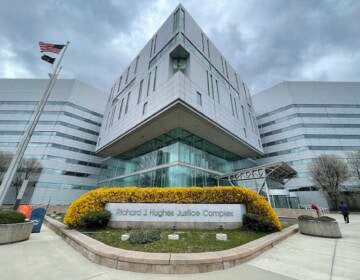Sex abuse at N.J. women’s prison ‘an open secret,’ DOJ report says
Investigators slammed New Jersey for failing to curb rampant sexual abuse at the Edna Mahan Correctional Facility for Women.

Edna Mahan Correctional Facility for Women in Clinton, New Jersey (Google Maps https://goo.gl/maps/QBnmSjENV1r)
New Jersey has failed to stop rampant sexual abuse at its only prison for women despite decades of documented problems and the convictions of several employees, the U.S. Department of Justice said in a scathing report this week.
Federal investigators detailed incident after disturbing incident at the Edna Mahan Correctional Facility for Women in Hunterdon County. So many corrections officers and staff pressured prisoners into sexual acts — using threats of punishment or promises of contraband — that several women described the abuse there as “an open secret.”
At the same time, “systemic failures” in the prison’s policies discouraged the women from reporting abuse, failed to ensure their allegations were taken seriously and left them without adequate supervision, which created opportunities for even more exploitation.
“[The New Jersey Department of Corrections] and Edna Mahan have been aware that their women prisoners face a substantial risk of serious harm from sexual abuse, and they have failed to remedy this constitutional violation,” investigators under New Jersey U.S. Attorney Craig Carpenito wrote.
The Justice Department issued New Jersey a long list of corrective actions and threatened a lawsuit if the state fails to comply.
A spokesman for the state Department of Corrections said Tuesday that the report focuses on events that occurred under a previous administration. Since New Jersey Gov. Phil Murphy nominated Marcus Hicks to oversee the department in May 2018, he said, Hicks has implemented several of the recommendations included in the report.
Those include creating gender-restricted job positions, installing more surveillance cameras, educating prisoners and staff on the federal Prison Rape Elimination Act, and making it easier to report abuse.
“The Department of Corrections remains committed to ensuring the safety of all those in its care, and, in service of that goal, continues to regularly monitor and evaluate its operations, programs and services,” Matthew Schuman, the spokesman, said.
Justice Department investigators called those steps “commendable,” but said that abuse likely continues to this day.
“Edna Mahan prisoners continue to raise credible allegations of staff sexual abuse and sexual harassment, despite the reforms,” they said.
They also acknowledged that a “culture of acceptance” of sexual abuse is so pervasive at Edna Mahan that it has survived several previous rounds of scrutiny.
Most recently, between 2016 and 2019, at least five corrections officers and one civilian employee, a vocational instructor in the prison kitchen, were convicted or pleaded guilty to charges related to sexual abuse of more than 10 women under their watch.
Built in 1913 as the State Reformatory for Women, Edna Mahan now houses about 550 women in Union Township, near the Pennsylvania border in the northwestern part of New Jersey.
Problems at the facility have existed for decades. At least eight corrections officers were charged with crimes related to sexual abuse in the 1990s and 2000s, according to the report, while many others have been fired and the subject of lawsuits brought by prisoners.
That history doesn’t make the more recent misconduct any less shocking. According to Justice Department investigators, staff at Edna Mahan routinely referred to prisoners as “dykes,” “strippers” and other names. Male corrections officers watched prisoners as they showered, used the restroom or — in one reported instance — inserted a tampon.
One corrections officer forced a prisoner to keep watch as he abused her, while others took advantage of “blind spots” in the facility’s physical layout. In one storage room without camera coverage, investigators found a mattress on the floor.
At the same time, women lacked a reliable, confidential means of reporting abuse. Those who did so anyway were subjected to a process in which they were strip-searched and held in solitary confinement as punishment. When internal staff investigated their complaints, they lacked the training and independence to do a thorough, unbiased job, according to the report.
Brenda Smith, a professor at the American University Washington College of Law and director of the Project on Addressing Prison Rape there, said changing the culture of an institution with such deep-seated problems will require “constant vigilance” that can’t be solved with a single report.
But, she said, the Justice Department’s intervention is some indication that the federal Prison Rape Elimination Act, which was enacted in 2003 but whose standards were not finalized until 2012, is starting to have its intended affect.
“In the past, prisoners were actually not even seen as victims. They did not have access to victims’ services,” Smith said. “So the fact that that plays a huge role in this report gives me hope that we are beginning to see people in custody not just for what they did, but for who they are and understanding that they can also be vulnerable and victims as well.”
WHYY is your source for fact-based, in-depth journalism and information. As a nonprofit organization, we rely on financial support from readers like you. Please give today.





